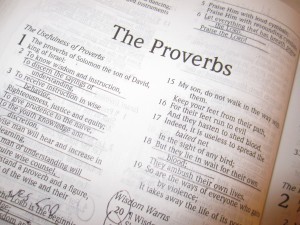Just Because Someone Quotes the Bible Doesn’t Mean He Knows What it Says
The Bible has become a favorite source of quotes for people in every conceivable corner of the political, social and theological spectrum. I recently heard the Bible quoted on both sides of the gay marriage and abortion debates. I’ve heard it used to justify child abuse, smoking dope, racism and even murder.
 But just because someone quotes the Bible doesn’t mean he or she has actually read it or has any real idea of what it says. So, I have a challenge for all who are interested in knowing where the Bible actually stands on any issue–FIND OUT FOR YOURSELF. Don’t take anyone else’s word for it, including mine. Do the biblical due diligence to know what the Bible says. It’s not rocket science. You can do it.
But just because someone quotes the Bible doesn’t mean he or she has actually read it or has any real idea of what it says. So, I have a challenge for all who are interested in knowing where the Bible actually stands on any issue–FIND OUT FOR YOURSELF. Don’t take anyone else’s word for it, including mine. Do the biblical due diligence to know what the Bible says. It’s not rocket science. You can do it.
Here are some things to remember when trying to understand the Bible:
1. Read it. Don’t read what someone says about it, read it for yourself. Have you actually read the creation accounts or the Laws of Moses and the Ten Commandments? Have you read Jesus’ Beatitudes or the biblical teachings on sexuality? Don’t let people filter the Bible for you. Read it for yourself.
2. Don’t prooftext. In other words, never build a theology or moral view on one verse. Verses are written in a very specific context–a flow of thought with a specific audience in mind. The Bible wasn’t dropped down from heaven in a social vacuum. If you’re going to know what the Bible is saying about certain things, then you’ve got to do some work to get into the mind and culture of the writers.
3. Along those same lines, the best interpreter of the Bible is the Bible. Never pull just one verse out and stake your worldview, political stance or theology on it. If you think a verse is making a specific point, ask yourself what the rest of the Bible teaches on that topic. Read cloudy, difficult passages in light of clear ones. Build your moral, political and social views on the teaching of the Bible as a whole, not just one or two verses.
4. Acknowledge your presuppositions and then set them aside. Or said differently, go to the Bible naked and let it clothe you. We all have things we believe the Bible says and even things we want it to say. We go to the Bible looking to find support for our points-of-view. That’s a sloppy and dangerous way to deal with any document. Mature Bible interpreters will acknowledge that they approach the Book with a set of expectations about it. They may have things they desperately want the Bible to say. Be mature enough to set those wants aside and let the Bible speak for itself. Don’t be afraid of where it might lead you, for it will never lead you astray. The point of reading the Bible is not to get from it what you want, the point is to get from it what it actually says. And if you are mature enough to read it that way, then it is going to be constantly slamming into your cultural and worldviews.
Don’t be biblically illiterate and don’t be biblically irresponsible. Before you quote the Bible as a source or accept someone else’s view who does, do your homework. Read it for yourself.



